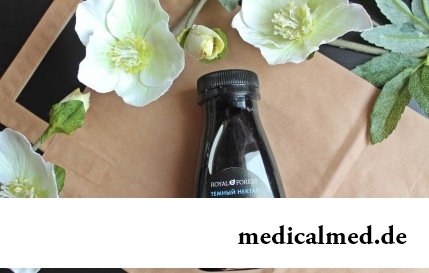





Dipheninum
Application instruction:
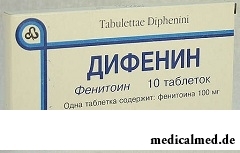 Dipheninum – drug with anticonvulsant action.
Dipheninum – drug with anticonvulsant action.
Form of release and structure
Dipheninum is released in the form of tablets (in planimetric bezjyacheykovy packagings on 10 pieces, on 1 or 2 packagings in a cardboard pack).
Active agent is a part of 1 tablet: Phenytoinum – 100 mg.
Indications to use
- Epilepsy (big convulsive attacks), epileptic seizures in neurosurgery, the epileptic status with toniko-clonic attacks (treatment and prevention);
- Ventricular arrhythmias (including connected with intoxication glycosides or tricyclic antidepressants);
- Epileptiform neuralgia (as means of the second row or along with carbamazepine).
Contraindications
- Sinus bradycardia;
- AV blockade of the II-III degree;
- Sinuatrial blockade;
- Morganyi-Adams-Stokes's syndrome;
- Cachexia;
- Heart failure;
- Porphyria;
- Functional disturbances of kidneys and liver;
- Pregnancy (except cases when the advantage for mother is higher than estimated harm for a fruit) and the lactation period;
- Hypersensitivity to drug components.
Route of administration and dosage
Dipheninum is accepted inside.
The adult drug usually appoint 3-4 mg/kg in an initial daily dose. The dose is gradually increased before achievement of optimum therapeutic effect. As a rule, the supporting daily dose makes 200-500 mg a day in one or several receptions.
To children usually appoint 5 mg/kg a day in 2 receptions with the subsequent increase in a dose, but it is no more than 300 mg in day. The supporting daily dose for children makes 4-8 mg/kg.
Side effects
During therapy development of disturbances from some systems of an organism which are shown with various frequency is possible:
- Alimentary system: perhaps – injuries of a liver, nausea, a lock, vomiting, toxic hepatitis. For the first 6 months of treatment the hyperplasia beginning with an ulitis can develop (meets at patients up to 23 years more often);
- Central and peripheral nervous system: perhaps – an ataxy, a nystagmus, changes of mood, confusion of consciousness, muscular weakness, dizziness, trembling of hands, lacks of coordination of movements, passing nervousness, sleep disorders, stutter or the greased speech; seldom – a peripheral neuropathy;
- Endocrine system: perhaps – enlargement of features, including expansion of a tip of a nose, a thickening of lips and promotion of a mandible, a hypertrichosis;
- Musculoskeletal system: perhaps – a palmar fibromatosis; seldom – a peripheral polyarthropathy. At long therapy without observance of the diet satisfying the need for vitamin D or at a lack of sunlight there can be rickets and osteomalacy;
- System of a hemopoiesis: seldom – megaloblastny anemia, thrombocytopenia, a granulocytopenia, a leukopenia, a pancytopenia, an agranulocytosis;
- Metabolism: perhaps – the disturbance of digestion of glucose caused by insulin release inhibition, development of a hypocalcemia and disturbance of metabolism of vitamin D;
- Allergic reactions: seldom – skin rash which can be a symptom of heavier skin reactions, an eosinophilia, a medicinal lymphadenopathy, fever;
- Others: seldom – Peyroni's disease.
Special instructions
With hypersensitivity to one of hydantoic anticonvulsants hypersensitivity and to other medicines of this group is possible.
Sudden phase-out of Difenin at the patients having epilepsy can lead to development of a withdrawal. In need of sharp cancellation of therapy (for example, at development of hypersensitivity reactions or allergic reactions) it is necessary to use the anticonvulsant drugs which are not relating to hydantoin derivatives.
Phenytoinum is intensively metabolized in a liver therefore the patient with functional disturbances of a liver, and also to elderly patients it is necessary to adjust the dosing mode.
During therapy, especially long, it is recommended to keep to the diet satisfying the need for vitamin D, it is also necessary to provide influence of UF of radiation.
When using Difenin's at children in a growth period the risk of development of disturbances from connecting fabric increases.
Concentration of Phenytoinum in plasma can increase at an acute drunkenness; at an alcoholism – to decrease.
During Difenin's reception the speed of psychomotor reactions is slowed down that needs to be considered when working, the requiring special attention and bystry psychomotor reactions, including control of motor transport.
Medicinal interaction
At simultaneous use of Difenin with some medicines there can be undesirable effects:
- The medicines exerting the oppressing impact on the central nervous system: strengthening of the oppressing influence on the central nervous system is possible;
- Antifungal means, clozapine, digitoxin, glucocorticosteroids, are oestrogenic, дикумарол, furosemide, doxycycline, oral contraceptives, quinidine, rifampicin, vitamin D: change of their therapeutic action is possible;
- Amiodaronum, antifungal means (including флуконазол, B Amphotericinum, Miconazolum, кетоконазол, итраконазол), metronidazole, sulfonamides, blockers of histamine H1 receptors, chlordiazepoxide, Tolbutamidum, chloramphenicol, salicylates, дикумарол, diazepam, a halothane, fluoxetine, an isoniazid, methylphenidate, омепразол, are oestrogenic, suktsinimida, Sulfinpyrazonum, Trazodonum: increase in concentration of Phenytoinum in a blood plasma is possible that can lead to strengthening of its therapeutic action and increase in risk of development of side effects;
- Acetazoleamide: development of osteomalacy, rickets is possible;
- Phenobarbital, derivatives of a fenotiazin (including Chlorpromazinum, prochlorperazine, thioridazine), antineoplastic means: increase or decrease in concentration of Phenytoinum in a blood plasma is possible (Difenin's influence on concentration in plasma of phenobarbital is unpredictable);
- Valproic acid: within the first several weeks of therapy the general concentration of Phenytoinum in a blood plasma can decrease;
- Acyclovir: reduction of concentration of Phenytoinum in a blood plasma and decrease in its efficiency is possible;
- Verapamil, нимодипин, фелодипин: reduction of their concentration in a blood plasma;
- Desipramine, pyridoxine in a dose of 200 mg: reduction of its concentration in a blood plasma is possible;
- Imipraminum, кларитромицин, ритонавир, фелбамат: increase in concentration of Phenytoinum in a blood plasma is possible;
- Paracetamol: decrease in its efficiency;
- Vigabatrin, carbamazepine, Reserpinum, folic acid, сукральфат: reduction of therapeutic action of Phenytoinum and its concentration in a blood plasma is possible;
- Theophylline: decrease in their concentration in a blood plasma and efficiency is possible;
- Sukralfat: reduction of absorption of Phenytoinum;
- Phenylbutazone, Cimetidinum, Disulfiramum, diltiazem, nifedipine, габапентин: increase in concentration of Phenytoinum in a blood plasma with the subsequent development of toxic reactions is possible;
- Folic acid: decrease in efficiency of Phenytoinum;
- Ciprofloxacin: change of concentration of Phenytoinum in a blood plasma is possible, interaction of drugs is ambiguous.
Terms and storage conditions
To store in protected from light, the place, dry, unavailable to children, at a temperature of 5-30 °C.
Period of validity – 4 years.
To tell even the shortest and simple words, we involve 72 muscles.

The stroke is one of the most widespread diseases of the person, annually in the world about 6 million cases эт are registered...
Section: Articles about health
Life does not indulge the modern woman special emotional comfort and carelessness. The fatigue, troubles at work, misunderstanding in a family and various illnesses immediately affect a condition of hair and skin. And to look safe and attractive so хоч...
Section: Articles about health
Bees – really unique beings. Practically all products of their life activity are used by the person. Since the most ancient times medicinal properties of honey and other substances received in the course of beekeeping are known. The fact that all these products are recognized not only national, but also official medicine is especially significant. About influence and routes of administration of bee "drugs" the speech in this article will also go....
Section: Articles about health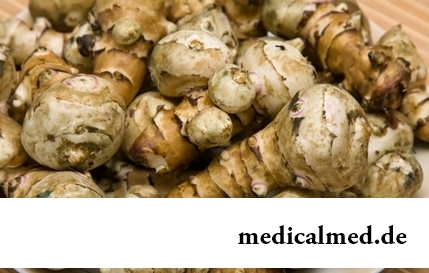
At this plant there are a lot of names: tuberiferous sunflower, Jerusalem artichoke, solar root, earth pear. Contrary to spread...
Section: Articles about health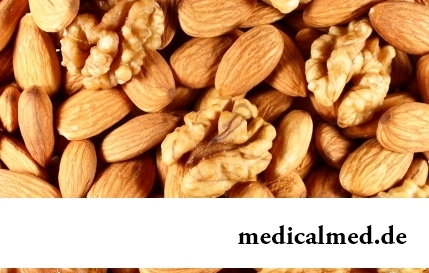
For the last decades the diabetes mellitus of the second type became really world problem. The number of cases annually increases, and average age of patients for whom the illness is diagnosed, steadily decreases. Specialists consider that one of osno...
Section: Articles about health
About 10-15 years ago existence of the computer in the apartment of the Russian was considered as a rarity and office rooms were only at the first stage of equipment by these useful devices. Today practically in each house there is a computer (and often not one), and a regular user is already every our second compatriot. Convenience and efficiency of personal computers are undoubted, but the people working with them daily have to know also about health hazard which they can predstavlit...
Section: Articles about health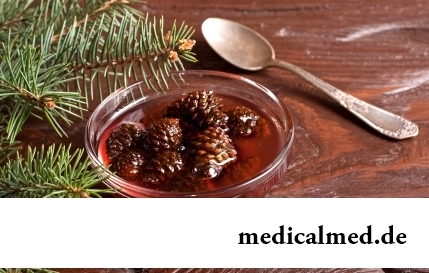
The pine is one of the most widespread plants of our woods. Its needles and pitch not without reason called by "gallipot", since ancient times испол...
Section: Articles about health
Coffee - the tonic loved by many for the invigorating aroma and deep taste. Having the stimulating effect, coffee increases working capacity, promotes concentration of attention, fights against drowsiness and improves mood. Statistically, about 30% of inhabitants...
Section: Articles about health
An eye of the person daily experiences considerable strain. The problem of preservation of sight is for many years directly connected with a question of supply of tissues of eye enough oxygen and nutrients. This task is carried out by small vessels – capillaries. For normal functioning of the visual device extremely important that they kept the integrity, but it works well not always. Microtraumas of eye vessels during which there are small hemorrhages it is extraordinary расп...
Section: Articles about health
More than a half of the married couples which faced prostatitis – leave. The new broadcast "Female View of Prostatitis" will help to learn...
Section: Articles about health
All got used long ago that, having addressed the plastic surgeon, it is possible to modify natural parameters of a figure or to minimize the damages put to appearance with ruthless time. Many people (preferential women) worldwide е...
Section: Articles about health
Feeding by a breast - the integral part of ideal motherhood allowing to come into contact with the kid and to create to it healthy immunity since early years. Nevertheless, this important process in life of mother and child can be saddened laktostazy − by a milk delay in a mammary gland. What main reasons for a laktostaz? How not to allow problems with breastfeeding? Let's consider 10 premises resulting in stagnation of milk at the nursing mother....
Section: Articles about health
Each woman has preferences in the field of use of those goods which help us to look good, feel се...
Section: Articles about health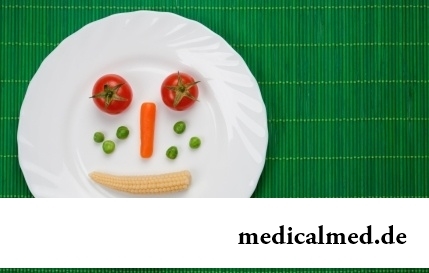
About influence of fasting days on an organism it is told much – both about advantages, and about shortcomings. It is considered that fasting day in the form of a short-term monodiet is useful, promoting effective removal of slags from an organism whereas irregular, it is excessive п...
Section: Articles about health
Separate food - the system of meal based on digestion physiology which is carried to improvement methods. According to nutritionists, the separate use of the carbohydrate and proteinaceous products demanding different conditions of assimilation helps to get rid of diseases of digestive tract and serves as prophylactic from a diabetes mellitus, arthritis, food allergies, cholelithiasis and many other frustration. The essence of salutary effect of a method consists in most Kacha...
Section: Articles about health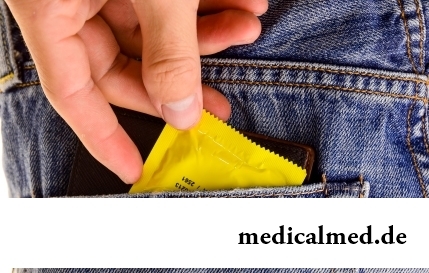
Today about 30 diseases, sexually transmitted are known. To wide circulation of these illnesses extremely with...
Section: Articles about health
The words "disease" and "patient" not without reason come from one root – "pain". As a rule, symptoms of illnesses thoroughly spoil to patients life. However from this rule there are exceptions. Some diseases are shown by signs which can cause even полож...
Section: Articles about health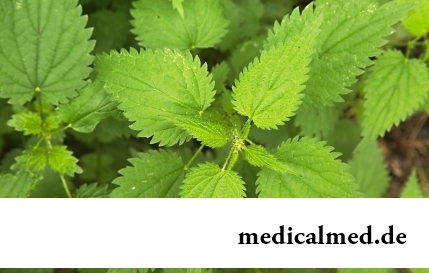
What is in our understanding weeds? It plants which are considered to be suitable only for compost pits and feeding of animals. Meanwhile, among the weeds growing literally under legs it is possible to find the mass of the officinal herbs having invaluable advantage for human health. It is possible not only to be treated by most of them, using as broths, tinctures, compresses, but also to accept in food as usual products. Let's consider 8 widespread and often ignored by people...
Section: Articles about health
Is told about advantage of domestic animals for development of the child much. But many parents nevertheless do not hurry to bring pets as about...
Section: Articles about health
The endocrine system carries out extremely important role in a human body, practically all processes of life activity are regulated by it. Closed glands (hemadens) produce special biologically active agents – hormones which then o...
Section: Articles about health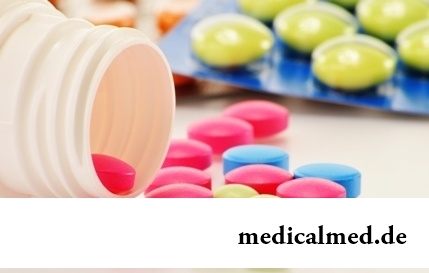
Dietary supplements (dietary supplements) for the last decades were so thoroughly included into our life that, apparently, it is already impossible to find the person who at least once did not try them. At the same time, most of our compatriots have a vague idea of what dietary supplements as they affect a human body consist of and what differ from the real medicines in. Let's try to understand these questions, and at the same time and to understand, such additives are how necessary for us....
Section: Articles about health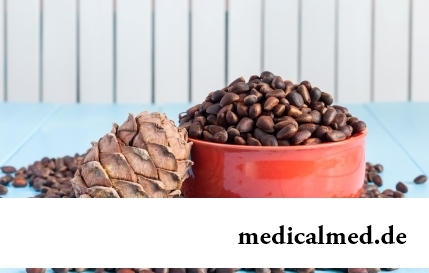
The hysteromyoma is diagnosed more than at a third of women 35 years are more senior. This high-quality new growth, which on early a stage...
Section: Articles about health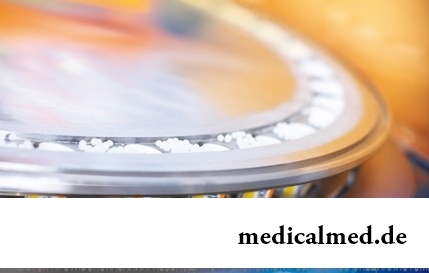
For the help to doctors in the choice of optimal solutions for treatment of various diseases the Cochrane scientific organization (Cochrane) conducts joint researches with representatives of scientific community around the world. The analysis of a series became carried out by one of the last methanolyses...
Section: Articles about health
There is a lot of fans of beer in our country. Statistically, on each average Russian (including women and children) in a year about 60 liters of this drink are consumed. It is not a lot of, as in the Czech Republic or Germany, but figure all the same impressive. There is nothing to rejoice here: despite assurances of producers that beer is absolutely harmless, effects of its active consumption cannot be considered positive in any way. Here only part of that negative impact, which popular нап...
Section: Articles about health
Household skills which to us so diligently imparted in the childhood it appears, not always bring only benefit. According to result...
Section: Articles about health
Life expectancy in various regions of Earth is not identical. Social stability, economic wellbeing, availability and level of medical care, household comfort, literacy of the population in the field of observance sanitary гигиен exert impact on it...
Section: Articles about health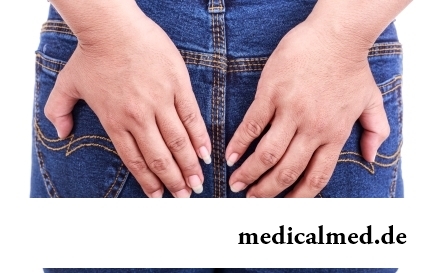
Hemorrhoids – extremely widespread disease. Periodically arising inflammations and bleeding of hemorrhoidal nodes cause serious discomfort to nearly fifteen percent of adults. Meanwhile, having a clear idea of the reasons of an exacerbation of an illness and following rules of precaution, it is possible to reduce substantially sharpness of unpleasant feelings and to reduce progressing of a disease....
Section: Articles about health
